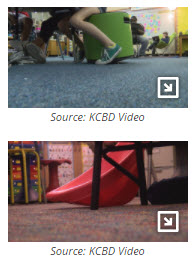Lubbock Teachers Using Technology, New Seating To Help Kids Concentrate
According to the Centers for Disease Control, the diagnosis of Attention Deficit and Hyperactivity Disorder has risen across the United States in recent years.
From 7.8 percent of school-aged children in 2003, to 9.5 percent in 2007 and 11 percent in 2011.
However, an article in the Washington Post questions whether there really are more kids with ADHD, or if kids just aren't getting out as much energy as they were 20 years ago.
"I don't know for sure that we have more children that have these problems, I think we're more willing and more able to identify the problem," says Amanda Masters - M.D., who is in pediatrics with Texas Tech Health Sciences Center.
Dr. Masters says while diagnosing ADHD is something she's familiar with, it's also something she's mindful of.
"There certainly are concerns where we can over-diagnose and over-treat things that would be normal behaviors in kids, and the Academy of Pediatrics has actually put out guidelines trying to prevent this," says Masters.
She says there's a specific reason for that caution.
"A certain amount of ADD, ADHD characteristics are normal," Masters says.
She says those characteristics are especially common in younger children - which is why she says teachers are so crucial in a child's life.
"Let kids be kids and still try to get them to learn," Masters says.
Masters' mentality is something teachers across the Hub City are embracing.
At South Elementary within Lubbock-Cooper ISD, 1st grade teachers, Erin Pollard and Sarah Price, decided to bring in alternative seating in their classrooms this year.
"For 1st grade, we have a lot of movers, our kids like to move, they like to fidget. So, for those kids, they couldn't think about what they were supposed to be learning. This gives them this outlet. They can bounce on the bouncy balls, on the floor they can rock on the rocking chairs. The ones that like to stand and kneel and stand, they can do that and they can still feel comfortable and they don't feel like they're going to get in trouble if they do those thing," Erin Pollard says.
"I have lots more completion, as well as success. They're able to get their work finished, they're able to as well as it improving our grades overall," Sarah Price says.
Meanwhile, across town, at Hardwick Elementary within Lubbock ISD, teachers are relying on technology to help their students connect.
Head-start Pre-K teacher, Kaitlin Kidwell uses a program called "The Osmos".
"There's one that works on vocabulary, letters, numbers, shapes, everything that you can imagine, and right now, none of them are coming up to me, they don't have any questions for me, it's a great way to keep them involved," Kidwell says.
But, the use of technology doesn't stop as kids move up a grade.
5th graders in Lindsey Sobehrad's class use Google tablets frequently.
"I think it's about meeting the students where they are. We live in a world where they're on video games, they're on their cell phones, they're watching TV, their world is technological, and so why are we still having classrooms that look like the 1950's without the technology in it," Sobehrad says.
However, that technology goes beyond engaging for 5th grader Ryleigh Duke.
"It makes me feel less pressured, kind of, like less tense, cause now that I know if it's the right or wrong answer, than just having a 50-50 percent chance that it's right or wrong," Duke says.
Dr. Masters says while alternative seating, and even technology can help keep a child focused within the classroom, if your child is diagnosed with ADHD, there is something important to remember.
"What I tell parents all the time, is this has nothing to do with your intelligence, it has to do with how you need to learn," Masters says.
She says with today's knowledge and the treatment and technology available, the stigma surrounding the diagnosis is continually improving.
"I think now, people see it as something where we can get some help. And so, instead of 'no I don't want my child labeled, it's let's do everything we can do to make my child successful."
Links to Washington Post articles:
Related Stories
How Does Your Garden Grow?
As spring approaches, some people’s thoughts turn to gardening. Whether it’s a flower garden they desire or a vegetable garden want to have, they begin planning what they’ll plant and what they need to do to ensure a successful garden.
Adopt a Growth Mindset for a Better Life
A “growth mindset” accepts that our intelligence and talents can develop over time, and a person with that mindset understands that intelligence and talents can improve through effort and learning.
Drug Use, Family History Can Lead to Heart Disease in Younger Adults
Abstaining from drug abuse and an early diagnosis of familial hypercholesterolemia (high cholesterol) can help prevent heart disease.
Recent Stories
The TTUHSC Laura W. Bush Institute for Women’s Health Welcomes Ben Carson as Power of the Purse Keynote Speaker
Retired neurosurgeon and former U.S. Secretary of Housing and Urban Development Ben Carson, M.D., delivered a keynote address at the Power of the Purse luncheon and fundraiser today (April 18).
Filling the Gap: PA Impact on Rural Health Care
Assistant Professor and Director of Clinical Education Elesea Villegas, MPAS, PA-C, spoke about the challenges rural health care currently faces and how PAs are stepping up to better serve the rural patient population.
School of Pharmacy Remembers Contributions of Key Collaborator
Cynthia Nash, Pharm.D., served as an Adjunct Assistant Professor of Pharmacy Practice for the School, and was an instrumental collaborator and key ally in our partnership with the Dallas VA North Texas Health Care System.

